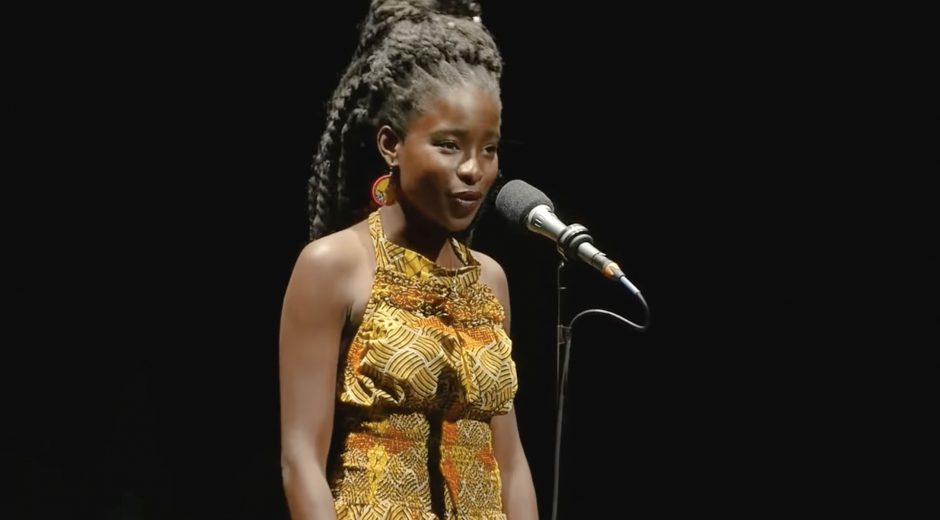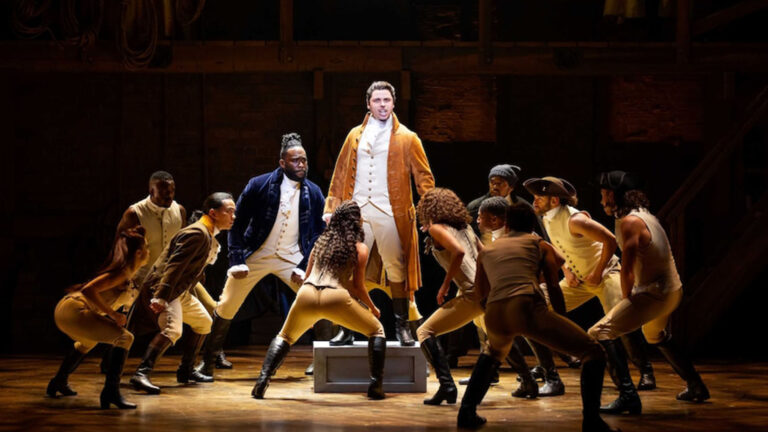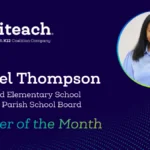How a Teacher Inspired Amanda Gorman
There is power in words. It is through words that we tell our stories, how we record history, and how we motivate people to action and create change. Recently, a 22 year old young woman took the stage at the presidential inauguration. Her words were powerful and beautiful. But beyond what was written, Amanda Gorman radiated a poise and grace that was really quite incredible. Her mother teaches middle school and Amanda says, “Having a mom who is a teacher had a huge impact on me,” said Gorman, who witnessed her ability to empower young people through language. Long before she began reading her own poetry aloud in grand spaces for grand occasions — from the Fourth of July to the inauguration of a new president of Harvard University — Gorman was falling in love, simultaneously, with the written and spoken word.”
“Her relationship with poetry dates at least to the third grade, when her teacher read Ray Bradbury’s “Dandelion Wine” to the class. She can’t recall what metaphor caught her attention, but she remembers that it reverberated inside her.” (Apple News)
Teachers, Leave Your Mark
Sometimes, as educators, we may not even realize the impact we are having on a student. Would Gorman’s third grade teacher know that a reading from “Dandelion Wine” would light a fuse in a little girl that would one day ignite a bonfire of words that would burn white hot on a cold day in Washington D.C.? I doubt it, but that’s exactly what happened. Whatever your views in our current political landscape, it is hard not to feel the impact of Gorman’s powerful words:
“We close the divide because we know, to put our future first,
we must first put our differences aside.
We lay down our arms
so we can reach out our arms
to one another…”
Success does not come from division, but unity. Our differences and our diversity are what makes us stronger, not conformity. “Variety is the spice of life” is not just a kitschy quote that should be plastered on wooden signs and placed in our kitchens. Rather, it should be a reminder written on our hearts, that when we see someone who is different than us, that believes differently, that sees the world differently, that their perspective is a gift. Different viewpoints does not mean that our viewpoint is wrong, just different, and that’s not just okay, it’s a good thing.
A Teacher Creates Hope for the Future Even in the Middle of Conflict
Retired Finnish school teacher Lea Hopkins is in the middle of starting a volunteer teaching stint in Mundri, South Sudan. She says,
“I didn’t know much about South Sudan previously, but when the opportunity to work here came, it just felt right. The more I get to know this country, the more fascinating it seems!”
To Hopkins, being a teacher is a way of life. “I am now in my 60s. As a young teacher, I teached, when older, I raised. I hope that my students have learned from me a curiosity for knowledge, basic principles of life, and above all, a respect for life in all its forms. All life is sacred and valuable.”
(FCA)
When day comes we ask ourselves,
where can we find light in this never-ending shade?
The loss we carry,
a sea we must wade.
We’ve braved the belly of the beast,
We’ve learned that quiet isn’t always peace,
and the norms and notions
of what just is
isn’t always just-ice.
And yet the dawn is ours
before we knew it.
Somehow we do it.
Somehow we’ve weathered and witnessed
a nation that isn’t broken,
but simply unfinished.
We the successors of a country and a time
where a skinny Black girl
descended from slaves and raised by a single mother
can dream of becoming president
only to find herself reciting for one.
And yes we are far from polished.
Far from pristine.
But that doesn’t mean we are
striving to form a union that is perfect.
We are striving to forge a union with purpose,
to compose a country committed to all cultures, colors, characters and
conditions of man.
And so we lift our gazes not to what stands between us,
but what stands before us.
We close the divide because we know, to put our future first,
we must first put our differences aside.
We lay down our arms
so we can reach out our arms
to one another.
We seek harm to none and harmony for all.
Let the globe, if nothing else, say this is true,
that even as we grieved, we grew,
that even as we hurt, we hoped,
that even as we tired, we tried,
that we’ll forever be tied together, victorious.
Not because we will never again know defeat,
but because we will never again sow division.
Scripture tells us to envision
that everyone shall sit under their own vine and fig tree
and no one shall make them afraid.
If we’re to live up to our own time,
then victory won’t lie in the blade.
But in all the bridges we’ve made,
that is the promise to glade,
the hill we climb.
If only we dare.
It’s because being American is more than a pride we inherit,
it’s the past we step into
and how we repair it.
We’ve seen a force that would shatter our nation
rather than share it.
Would destroy our country if it meant delaying democracy.
And this effort very nearly succeeded.
But while democracy can be periodically delayed,
it can never be permanently defeated.
In this truth,
in this faith we trust.
For while we have our eyes on the future,
history has its eyes on us.
This is the era of just redemption
we feared at its inception.
We did not feel prepared to be the heirs
of such a terrifying hour
but within it we found the power
to author a new chapter.
To offer hope and laughter to ourselves.
So while once we asked,
how could we possibly prevail over catastrophe?
Now we assert,
How could catastrophe possibly prevail over us?
We will not march back to what was,
but move to what shall be.
A country that is bruised but whole,
benevolent but bold,
fierce and free.
We will not be turned around
or interrupted by intimidation,
because we know our inaction and inertia
will be the inheritance of the next generation.
Our blunders become their burdens.
But one thing is certain,
If we merge mercy with might,
and might with right,
then love becomes our legacy,
and change our children’s birthright.
So let us leave behind a country
better than the one we were left with.
Every breath from my bronze-pounded chest,
we will raise this wounded world into a wondrous one.
We will rise from the gold-limbed hills of the west.
We will rise from the windswept northeast,
where our forefathers first realized revolution.
We will rise from the lake-rimmed cities of the midwestern states.
We will rise from the sunbaked south.
We will rebuild, reconcile and recover.
And every known nook of our nation and
every corner called our country,
our people diverse and beautiful will emerge,
battered and beautiful.
When day comes we step out of the shade,
aflame and unafraid,
the new dawn blooms as we free it.
For there is always light,
if only we’re brave enough to see it.
If only we’re brave enough to be it.
Poetry is the Language of Bridges
For anyone who believes poetry is stuffy or elitist, National Youth Poet Laureate Amanda Gorman has some characteristically well-chosen words. Poetry is for everyone, she says, and at its core it’s all about connection and collaboration. In this fierce talk and performance from TED-Ed Weekend, she explains why poetry is inherently political, pays homage to her honorary ancestors and stresses the value of speaking out despite your fears. “Poetry has never been the language of barriers,” Gorman says. “It’s always been the language of bridges.
Become a Teacher. Change Lives.
If you are passionate about impacting the world around you there are few places where you can influence the future as much as a teacher. Teachers have the ability to build students up and set them on a positive course that can have a ripple effect for future generations.
If you are interested in becoming a teacher, check out our online teacher certification process and you could be teaching in a matter of weeks.





